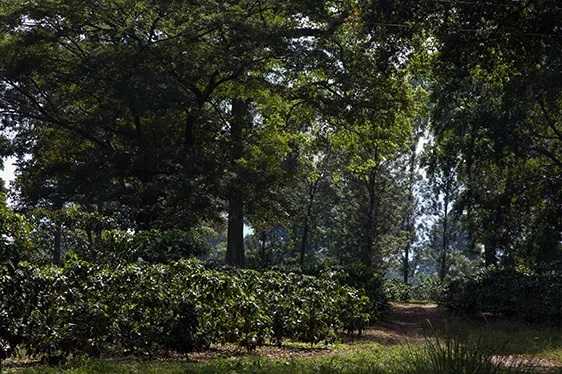HUDDERSFIELD, UK – The University of Huddersfield is helping rural communities in Ethiopia make a sustainable living while preserving the source of the something that keeps the world going on a daily basis – coffee. Ethiopia is the only place in the world where coffee grows wild, protected by the canopy of the mountain forests of a region close to the border with South Sudan.
Think of Ethiopia, and many people will assume it to be an arid, dry landscape, recalled from the images of the devastating famine in 1984. But that is far from the case everywhere, and the Bench-Sheko zone in the south west of the country is a lush, green area with altitudes of between 1,500m and 2,000m and around two metres of rainfall per year.
Preserving the origins of arabica coffee
Originating here, the coffee plant was first spread outside Africa by Arab traders, leading to the name of arabica coffee. Ethiopia’s wild forest coffee plants are a gene bank for the world, but also provide a valuable income for local farmers.
However, with deforestation and land degradation threatening livelihoods and coffee’s origins, the University’s Professor Adrian Wood and colleagues have designed a long-term project to improve prospects for the future via a sustainable development initiative.
Professor Wood is a professor in the Business School’s Department of Management and a member of the Centre for Sustainability, Responsibility, Governance and Ethics – widely known as SURGE.
He has been visiting and working in Ethiopia since 1973, linking field research to teaching and advisory support for NGOs and government agencies. His work on the five-year Community Conservation of Wild Coffee and Natural Forest (CCWCNF) project is funded by UK and US charities with additional support from the University. This project follows others working on Participatory Forest Management (PFM) that he has run from 2003 onwards, funded by more than £5m from the European Union.
“The real world is where we do action research by working with communities and testing new arrangements to manage resources,” says Professor Wood. “We work with a local partner organisation which recruits Ethiopian experts who, once trained, go out into the forest communities to work with farmers and government officials.”
Local communities managing the forests
Key to the University’s work is the partnership with the Ethio-Wetlands and Natural Resources Association (EWNRA), a not-for-profit civil society organisation whose mission is creating productive ecosystems that improve living standards for local people and conserve biodiversity. Formed in 2000 with support from a previous University of Huddersfield project, it has grown from just two employees and a motorbike, to now having a workforce of almost 200.
“Our work with EWNRA is about trying to create opportunities for communities to earn income from forests they are protecting and managing,” adds Professor Wood. “But it’s important that those forests pay their way. The forests are coming under active management by the local communities, rather than being neglected by the government, but that means extra work for local people.”
Wild coffee shrubs grow in the shade provided by the forests of the south-west highlands, but deforestation and a short-term approach to managing the land put this under threat. Owning the forests and managing them better benefits farmers when it comes to harvesting and selling coffee, but what about forest areas where arabica cannot be grown?
Honey and spices crops offer alternatives
Alternative sources of income have emerged from a range of non-timber forest products (NTFPs) such as wild honey, Ethiopian cardamom and the spice known as long pepper.
“We’re also working with a private company to explore how fruits from these forests can be made into jams. Some fruits and seeds could be used as ingredients for natural cosmetic products, and there are investigations into whether the oil from the Luya tree could be used in face creams. We’re looking to explore more ways that communities can generate income from the different types of Non-Timber Forest Products.”
The work on these non-coffee forest products is funded by DEFRA and DFID via the UK government’s Darwin Initiative, whose grant of £374k provides another approach to helping Ethiopian communities use their forests to build a stable and resilient local economy.
But despite the success in cultivating and growing wild coffee, the Afromontane forests of south west Ethiopia remain vulnerable. Managing the forest for coffee has changed the tree canopy, with other plants and tree seedlings at a lower level removed to grow arabica. The cost has been that new trees struggle to grow in the altered forest floor environment. This hidden degradation was identified by Dr Kitessa Hundera of Jimma University in Ethiopia, in conjunction with Landsat mapping and ground photography by Dr Byongjun (Phil) Hwang also from the University of Huddersfield. Solutions to this problem are now being sought through the partnership with Jimma University that Huddersfield has developed.
Environmental and economic benefits
Indeed, there is a wealth of knowledge that has been generated by researchers in the south-west of Ethiopia during the years that Professor Wood has visited Ethiopia. The region’s wild coffee was used to identify a gene that could resist a fungal problem called coffee berry disease, while a variety of coffee that is naturally low in caffeine has also been found amongst the wild arabica plants. But challenges remain to ensure a sustainable and economically viable future for these forests.
“The partnerships between the University and communities on the ground in Ethiopia are helping local people, researchers and the government explore how protecting the forest for both environmental and economic reasons can benefit everyone,” Professor Wood concludes.
















